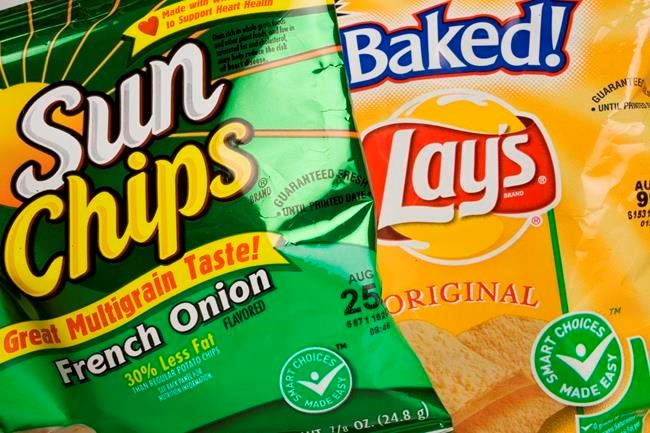One of Canada's biggest food manufacturers has halted shipments to the country's largest grocer in an extreme example of how inflation is impacting the food industry and driving a wedge between some retailers and suppliers.
At issue is a dispute over pricing between Frito-Lay Canada and Loblaw Companies Ltd. as the maker of brands like Cheetos, Doritos, Lays, Ruffles and Sunchips tries to recoup higher costs.
The situation has left the chip and snack food aisle of many Loblaw stores less full than usual or stocked with the retailer's house brands, President's Choice and No Name.
Frito-Lay spokeswoman Sheri Morgan confirmed there is a "temporary disruption" with one customer.
"Our business has faced unprecedented pressures from rising costs of items including ingredients, packaging and transportation," she said in an email.
"To help offset these pressures on our Canadian operations ... we have made adjustments to our prices that are consistent across the marketplace."
Loblaw spokeswoman Catherine Thomas said the grocer is "laser focused" on minimizing retail price increases.
"When suppliers request higher costs, we do a detailed review to ensure they are appropriate," she said in an email. "This can lead to difficult conversations and, in extreme cases, suppliers don’t ship us products."
The rift between Frito-Lay and Loblaw exposes deepening tensions in Canada's food industry that many experts say could worsen as supply chain challenges and inflation continue.
Some argue that grocers are simply trying to keep sticker prices low and stop suppliers from using inflation to justify unreasonable price hikes.
Others suggest grocers are using their market strength to bully suppliers and pad their bottom lines.
"It's challenging that it has devolved into such a confrontational relationship," said Michael Graydon, CEO of Food, Health & Consumer Products of Canada, an industry group which lists Frito-Lays parent company PepsiCo Foods Canada among its members.
"The level of frustration is growing."
The increase in wholesale prices some suppliers are seeking from retailers will help mitigate ongoing inflation but won't completely offset higher costs, he said.
The final price consumers pay in stores is set by grocery retailers — not food manufacturers, Graydon said.
However, retail industry advocates say food manufacturers are in some cases seeking price hikes that outpace inflation.
Retail Council of Canada spokeswoman Michelle Wasylyshen said the industry group, which represents Loblaw, has been contacted by both big and small grocery retailers about a flood of new price increases in January from vendors.
"This follows an already alarming number of increases in the preceding quarter," she said. "In many cases the increases are unprecedented and far exceed typical food inflation levels."
Statistics Canada said last week that food prices increased 6.5 per cent in January, the biggest year-over-year jump in grocery bills in more than a decade and higher than the overall annual inflation rate of 5.1 per cent.
It's unclear how the loss of sales at Loblaw, which includes conventional chains such as Zehrs, Atlantic Superstore and Provigo and discount stores No Frills and Maxi, could impact Frito-Lay.
The company's products are made in Canada, largely using Canadian potatoes grown by local farmers. Experts say a long-term drop in sales could ultimately hurt local producers.
But experts say brand loyalty will work in the chipmaker's favour.
"Frito-Lay is betting that the loyalty consumers have for their brands gives them leverage to make this move," said Joel Gregoire, associate director of Canada Food and Drink with market research company Mintel.
Yet pulling supply from Loblaw — which holds the largest share of grocery sales in Canada — is also risky for the food manufacturer, he said.
"Not filling orders to Canada’s largest grocer will no doubt have a substantial impact on Frito-Lay’s near-term sales," Gregoire said.
More broadly, he said the dispute appears emblematic of a broader battle for pricing leverage between grocers and manufacturers.
"This tension is not new, but this move by Frito-Lay has high stakes," he said. "This is a battle to maintain margins as costs rise."
Indeed, food expert Sylvain Charlebois said the friction between Frito-Lay and Loblaw is the "tip of the iceberg."
The hostility between retailers and manufacturers could worsen in the coming months, he said.
"This is not just about chips," said Charlebois, Dalhousie University professor of food distribution and policy. "We're going to be seeing this in other food categories like bakery and dairy as well."
This report by The Canadian Press was first published Feb. 22, 2022.
Companies in this story: (TSX:L)
Brett Bundale, The Canadian Press



